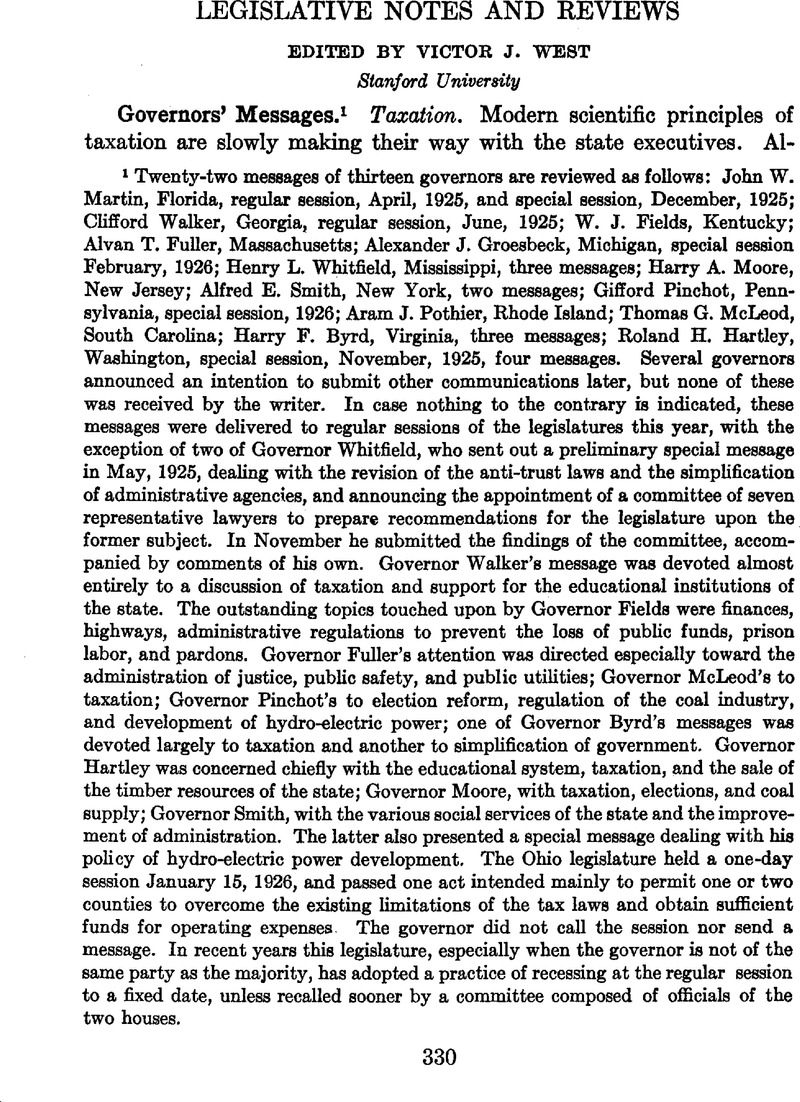No CrossRef data available.
Published online by Cambridge University Press: 01 August 2014

Twenty-two messages of thirteen governors are reviewed as follows: John W. Martin, Florida, regular session, April, 1925, and special session, December, 1925; Clifford Walker, Georgia, regular session, June, 1925; W. J. Fields, Kentucky; Alvan T. Fuller, Massachusetts; Alexander J. Groesbeck, Michigan, special session February,1926; Henry L. Whitfield, Mississippi, three messages; Harry A. Moore, New Jersey; Alfred E. Smith, New York, two messages; Gifford Pinchot, Pennsylvania, special session, 1926; Aram J. Pothier, Rhode Island; Thomas G. McLeod, South Carolina; Harry F. Byrd, Virginia, three messages; Roland H. Hartley, Washington, special session, November, 1925, four messages. Several governors announced an intention to submit other communications later, but none of these was received by the writer. In case nothing to the contrary is indicated, these messages were delivered to regular sessions of the legislatures this year, with the exception of two of Governor Whitfield, who sent out a preliminary special message in May, 1925, dealing with the revision of the anti-trust laws and the simplification of administrative agencies, and announcing the appointment of a committee of seven representative lawyers to prepare recommendations for the legislature upon the former subject. In November he submitted the findings of the committee, accompanied by comments of his own. Governor Walker's message was devoted almost entirely to a discussion of taxation and support for the educational institutions of the state. The outstanding topics touched upon by Governor Fields were finances, highways, administrative regulations to prevent the loss of public funds, prison labor, and pardons. Governor Fuller's attention was directed especially toward the administration of justice, public safety, and public utilities; Governor McLeod's to taxation; Governor Pinchot's to election reform, regulation of the coal industry, and development of hydro-electric power; one of Governor Byrd's messages was devoted largely to taxation and another to simplification of government. Governor Hartley was concerned chiefly with the educational system, taxation, and the sale of the timber resources of the state; Governor Moore, with taxation, elections, and coal supply; Governor Smith, with the various social services of the state and the improvement of administration. The latter also presented a special message dealing with his policy of hydro-electric power development. The Ohio legislature held a one-day session January 15, 1926, and passed one act intended mainly to permit one or two counties to overcome the existing limitations of the tax laws and obtain sufficientfunds for operating expenses. The governor did not call the session nor send a message. In recent years this legislature, especially when the governor is not of the same party as the majority, has adopted a practice of recessing at the regular session to a fixed date, unless recalled sooner by a committee composed of officials of the two houses.
1 Twenty-two messages of thirteen governors are reviewed as follows: John W. Martin, Florida, regular session, April, 1925, and special session, December, 1925; Clifford Walker, Georgia, regular session, June, 1925; W. J. Fields, Kentucky; Alvan T. Fuller, Massachusetts; Alexander J. Groesbeck, Michigan, special session February,1926; Henry L. Whitfield, Mississippi, three messages; Harry A. Moore, New Jersey; Alfred E. Smith, New York, two messages; Gifford Pinchot, Pennsylvania, special session, 1926; Aram J. Pothier, Rhode Island; Thomas G. McLeod, South Carolina; Harry F. Byrd, Virginia, three messages; Roland H. Hartley, Washington, special session, November, 1925, four messages. Several governors announced an intention to submit other communications later, but none of these was received by the writer. In case nothing to the contrary is indicated, these messages were delivered to regular sessions of the legislatures this year, with the exception of two of Governor Whitfield, who sent out a preliminary special message in May, 1925, dealing with the revision of the anti-trust laws and the simplification of administrative agencies, and announcing the appointment of a committee of seven representative lawyers to prepare recommendations for the legislature upon the former subject. In November he submitted the findings of the committee, accompanied by comments of his own. Governor Walker's message was devoted almost entirely to a discussion of taxation and support for the educational institutions of the state. The outstanding topics touched upon by Governor Fields were finances, highways, administrative regulations to prevent the loss of public funds, prison labor, and pardons. Governor Fuller's attention was directed especially toward the administration of justice, public safety, and public utilities; Governor McLeod's to taxation; Governor Pinchot's to election reform, regulation of the coal industry, and development of hydro-electric power; one of Governor Byrd's messages was devoted largely to taxation and another to simplification of government. Governor Hartley was concerned chiefly with the educational system, taxation, and the sale of the timber resources of the state; Governor Moore, with taxation, elections, and coal supply; Governor Smith, with the various social services of the state and the improvement of administration. The latter also presented a special message dealing with his policy of hydro-electric power development. The Ohio legislature held a one-day session January 15, 1926, and passed one act intended mainly to permit one or two counties to overcome the existing limitations of the tax laws and obtain sufficientfunds for operating expenses. The governor did not call the session nor send a message. In recent years this legislature, especially when the governor is not of the same party as the majority, has adopted a practice of recessing at the regular session to a fixed date, unless recalled sooner by a committee composed of officials of the two houses.
Comments
No Comments have been published for this article.